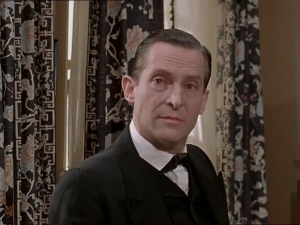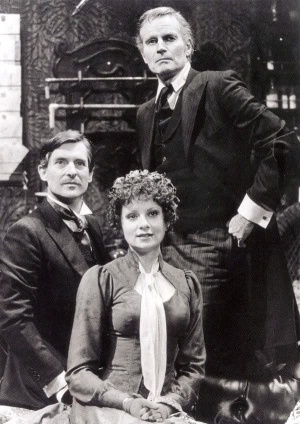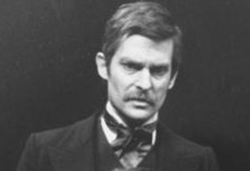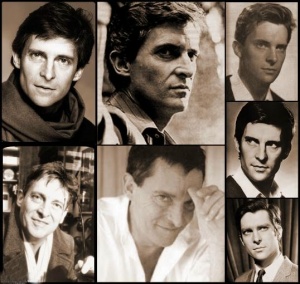Jeremy Brett



Jeremy Brett (3 november 1933 - 12 september 1995), born as Peter Williams Jeremy Huggins at Berkswell, near Coventry, in Warwickshire, England. He is most famous for his performance of Sherlock Holmes between 1984 and 1994 in the Granada TV series Sherlock Holmes. In ten years, he played in 41 episodes based on the original Sherlock Holmes stories, and is considered as the most faithful performer by sherlockians. His untimely death at 62 prevented him to do the whole 60 stories.
In 1987, he also played Sherlock Holmes in a stage play The Secret of Sherlock Holmes with the same Watson from the TV series (Edward Hardwicke).
But in 1980, he played Dr. Watson in the play The Crucifer of Blood with Charlton Heston as Sherlock Holmes.
Sherlokian adaptations
TV
- 1984 : The Adventures of Sherlock Holmes (as Sherlock Holmes) x7
- 1985 : The Adventures of Sherlock Holmes (as Sherlock Holmes) x6
- 1986 : The Return of Sherlock Holmes (as Sherlock Holmes) x8
- 1988 : The Return of Sherlock Holmes (as Sherlock Holmes) x5
- 1991 : The Casebook of Sherlock Holmes (as Sherlock Holmes) x9
- 1994 : The Memoirs of Sherlock Holmes (as Sherlock Holmes) x6
Theatre
- 1980 : The Crucifer of Blood (as Dr. Watson)
- 1987 : The Secret of Sherlock Holmes (as Sherlock Holmes)
Biography
A privileged childhood

His real name was Peter Williams Jeremy Huggins. He was born on 3 november 1933 in Berkswell, a charming village located like Stratford-Upon-Avon, hometown of Shakespeare, in Warwickshire. His father, Henry Williams Huggins, a member of a Huguenot family of French origin, was Lieutenant Colonel, and his acts of bravery during the First World War had earned him the Distinguished Service Order. His mother, Elisabeth Edith Butler Cadbury, a determined and generous woman, participated in Red Cross actions during the Second World War and presided over the Berkswell Women's Institute. Brett spent a happy childhood with his mother, whom he adored, and his three elder brothers. The family lived in a beautiful and extensive estate, The Grange, and practiced assiduously piano, archery and riding.
La vocation brave les obstacles


A passionate cinephile, the young Huggins was riding bicycle four times a week at the Cameo cinema in Berkswell. When he saw Laurence Olivier in Henry V, his emotion and enthusiasm were such that he decided to become an actor.
Though he was only twelve years old, it was not an ephemeral dream of a child, but an irrevocable choice. Indeed, he was born disabled by ankyloglossia (also known as tongue-tie, is a congenital oral anomaly that may decrease mobility of the tongue) which hindered the pronunciation of "r" and "s". Added to this, his dyslexia, a problem then little known that greatly interfered with his studies, the confused and even sometimes unintelligible speech of the future Sherlock Holmes made him the target of the mockery of his comrades. Placed at Eton as he left the primary school, like his brothers, he carved himself on the contrary of successes singing solo in the choir of the college with his magnificent voice of soprano. He was not happy, however, in this exclusively masculine establishment where strict discipline prevailed. At the age of sixteen, he won the college swimming competition. But his repeated plunges into the turbid waters of the Thames gave him an acute articular rheumatism. He recovered, despite the pessimistic predictions of the doctors, but as it can happen in this disease, his heart valves were seriously and definitively deteriorated, which had to have dramatic consequences a few decades later.
The adolescent, full of life and ambition, cared little for the distant future. He entered the famous Central School of Speech and Drama where, after a language operation, a careful rehabilitation finally allowed him to articulate normally. Terrified at the thought of regressing, he nevertheless forced himself all his life to daily exercises of diction. However, there remained a very dark shadow on the picture: his father, who would have liked to make him a soldier, considered the comedians as contemptible histrions and refused to play under his real name. The young man then adopted the pseudonym of Jeremy Brett and won the three main prizes of the school, including the Elsie Fogerty Prize and the William Ford Memorial Prize. "When the characters' emotions appear between the lines," a critic said of the Misanthrope scene he played with Wendy Craig, "it is evidence of a great natural talent of the actors."
The Library Theatre, or learn through practical experience
Admitted to the Library Theatre in Manchester, Brett played there for two years, many roles of young leading man. He was Mark Antony in Julius Caesar of Shakespeare, Brother Martin Ladvenu in St. Joan of Bernard Shaw, the Duke of Aumerle in Richard III and Gerard in Puss in Boots. This learning by an intensive practice enabled him to perfect his art in a way that no school could have made possible. He also made his television debut in Mrs. Dot and a first and very brief film appearance in Svengali under the identity of Pierre, a student at the Fine Arts.
It was at the Library Theatre that he met : Robert Stephens, who would be his best friend for life, and later played the great detective in Billy Wilder's film The Private Life of Sherlock Holmes ; Michael Cox, then Assistant Steward ; and Rosalie Williams, the future Mrs. Hudson inthe Granada TV series, which played Desdemona in the version of Othello where Brett played Cassio.
A door as quickly closed as opened
In 1955, King Vidor, looking for an actor capable of playing Nicolas Rostov in his Hollywood blockbuster War and Peace, spotted Brett's photo: tall, brown, slim and seductive, he would make a perfectly likely brother to Natacha Rostov, played by the marvelous Audrey Hepburn. In fact, the two actors formed a beautiful fraternal couple. But War and Peace, if won several prizes, won neither the audience nor the critics, who considered him long, unpredictable, heavy and boring. Brett, who played only a secondary role and was absent from the screen for long periods of time, could still have attracted the attention of producers if the film had been a brilliant success. But that was not the case, and the doors of Hollywood, which had seemed to open wide before him, quickly closed...
Brett at the Old Vic Theatre
Having entered the Old Vic Theater, Brett certainly does not lose his time. He played in a considerable number of plays and most of the time with success. He obtained the main role of Troilus and Cressida, which earned him highly critical reviews. On tour in Canada, he met Anna Massey (daughter of Raymond Massey, who in 1931 played the role of Sherlock Holmes in The Speckled Band). He married her in 1958 and had one son, David. But the couple is poorly matched and the two young and ambitious actors, who are neither ripe for marriage, will divorce four years later. In 1959, his mother, Elizabeth Huggins, died in a car accident. She who encouraged her son so much to follow his vocation as an actor despite paternal opposition, will not have the joy of seeing him play shortly after the role of Hamlet, of which every young actor dreams to prove himself. Brett is clearly "a prince among the actors," commenting on the magazine Theater World. Brett's performances in Oscar Wilde's The Portrait of Dorian Gray and Cocteau's The Typewriter also earned him warm praise.
But none of these successes lead to the offer of a major role in a major series, even if Brett is voted Tomorrow's Star in the TV show The Award Show. On cinema, he had the opportunity to play in The Wild and The Willing (1962) and in The Very Edge (1963) (http://www.youtube.com/watch?v=dkZZiCe1MjA video) but were not remarkable productions, and did not allow him to stand out. In fact, he understood that his superb presence, his beautiful voice and his distinguished diction enclosed him dangerously in roles of aristocratic and seductive characters who at the time tend to become obsolete and marginal. On the contrary, productions worked towards to realistic dealing with social problems and staging rough, rude and rebellious fellows from popular circles. In 1960 Brett played in the musical Johnny The Priest, the role of a priest seeking to turn young men on the right path. His personal performance was hailed by critics. Yet the play failed because, too respectful of religion and traditional morality, it appears singularly old-fashioned.
A back and forth between tradition and modernity

In 1963, Brett finally met his idol, Laurence Olivier, a brilliant and demanding master who compels him to progress. Olivier has recruited brilliant prospects such as Derek Jacobi, Robert Stephens, Lynn Redgrave and Jeremy Brett for the prestigious National Theater, of which he became artistic director.
In 1964, his Hollywood dream is on again with his role of Freddie Einsford-Hill, suitor of Elisa Doolittle, in the big budget musical My Fair Lady (video). The pay is enticing and especially, Brett saw in the role that was offered the chance to finally become a star of the big screen. Olivier is furious to see his new recruit escape him, but the Warner Brothers awarded him a royal compensation. Brett arrived in America exalted and full of enthusiasm, but the reality will prove very different from his dreams. The movie is a huge success and the performance of the young British is rewarded with a prize and highly praiseworthy critics. But while he mastered singing, the songs, like those of Audrey Hepburn, were recorded before his arrival. As for the main actor, Rex Harrisson, he was haughty and unconcerned. But most of all, Brett will have to wait eight months in Hollywood until all his scenes are filmed and many interesting offers will be missed.
The play that Brett agreed to play on Broadway contrasted strikingly with My Fair Lady, the last great American musical in the old fashion, full of magnificence and gaiety. It was in fact The Deputy in which Brett portrayed Father Fontana, a young cleric revolted by Pope Pius XII's attitude to the persecution of the Jews. The play, which this time dealt with a dramatic contemporary subject, unleashed controversy, but criticism praised the ardor and energy of the actor.
Returning to a more classic repertoire, he successfully played Beliaev's character in A Month in the Country, facing Ingrid Bergman. But while Brett fluttered, choosing as he pleases from the various roles passing within his reach, his friend Robert Stephens repeated three roles at once under Laurence Olivier's pitiless ferrule and thus ensures prestige, fame and brilliant future. It was only in 1967 that Brett made his debut at the National Theater. His performance is noticed in John Dexter's all-male and highly contested version of As You Like It. During a fight scene, his nose was broken, to his great satisfaction. For, he explained, his face had finally a personality. He also wins a great success in Love's Labours Lost, where he plays one of his favorite roles, the subtle Berowne.
The role of Guevara in the experimental piece Marcrune's Guevara, plunged him back into the heart of the most burning contemporary news, whereas that of Bassanio, in The Merchant of Venice (video) brought him back to the classical repertoire. His last performance for the National Theater will be, in 1970, his portrayal of George Tesman in Henry Ibsen's Hedda Gabler. The Daily Telegraph will describe his interpretation as totally credible, unlike its predecessor.
So far, he had a rich repertoire and a wide eclecticism: he passed from a political film about the Cypriot independence struggles in An Act of Reprisal (1965, video) to a television adaptation The Three Musketers (1966, video) and then Tartuffe (1967), from the role of thug Jeff Walker in The Baron (1967) to that of Count Danilo in The Merry Widow (1968, video) and after performing Lord Arthur Goring in An Ideal Husband by Oscar Wilde (1969, video). In 1969 he was the improbable Bey of the equally unlikely series of Champions in "Desert Journey" (1969). Brett belonging to the school of the "becomers", the actors who become their character in order to play it better, one can wonder, what effects could have such metamorphoses on a unstable and fragile mind.
Brett in USA and TV
In early 1970s, without forsaking the stage, for which he had a natural taste, Brett focused more and more towards television. Playing a play for the small screen avoids the repetitive effect that a series of theatrical performances entails, and the show is recorded. Moreover, the actor, who has already worked in the USA, has been seduced by the warmth and the capacity of enthusiasm of the public, and it is essentially on the other side of the Atlantic that he was seeking success. He will find a wife, Joan Sullivan. An happy marriage this time, which will last a decade, until Joan is carried away by a cancer of the pancreas in 1985.
Joan Sullivan, a producer for WGBH in Boston, was a remarkable television woman. Passionate about English culture, she offered British programs to the American audience. She created anthology programs, such as Masterpiece Theater, for the Public Broadcasting Service of America (PBS), as well as the famous show Mystery! Joan had spotted Brett in London as he played in the Christmas play Coward A Design for Living, and from that moment she fell in love. They worked together on Classic Theater, where Brett played Sheridan's The Rivals (video), got married in 1977 and Settled in Boston. In 1978, Brett had a huge success in Dracula, where, according to critic Anne Bloom, "the graceful, almost tender manner in which he seduced Miss Lucy inspired half the female audience to be his next victim." The following year, he turned for British television, with Joanna David (with which he will play in The Cardboard Box in 1994) an excellent version of Rebecca (video), unfortunately not reissued for obscure copyright reasons. According to BFI (British Film Institute), Brett "plunged into the tormented soul of Maxim like no other before him."
As in the previous period, the diversity of Brett's performances is truly staggering. He played in 1976 in A Midsummer Night's Dream, in 1981 in Macbeth, in 1982 in The Good Soldier (video), the subtle novel by Ford Maddox Ford and in 1983 in Lonsdale's spiritual and hilarious comedy On Approval (video). In the same year, he portrayed the character of Prime Minister William Pitt the Younger in Number 10, Bloodlines ([http://www.youtube.com/watch?v=z-TMN3eMdRs video) with admirable flexibility and power of expression. But he did not disdain to appear as guest star in 1978 in the episode Of Guilts, Models and Murder of The Incredible Hulk, where he performed the perfidious James Joslin and he even accepted in 1980 the role of Lieutenant Nash in Spaceball, the most distressing episode of Battlestar Galactica. Indeed, Brett does not want to miss any opportunity to make himself known and recognized by Hollywood. In an interview, he is pleased with the fact that he has never been out of work, unlike many actors, even though his roles were not always prestigious. And he adds that he found pleasure in playing in the most unprofessional series, as in the plays of the great classics.
But his encounter with the great detective is approaching. A pioneer, at the end of 1980, he played Watson in Paul Giovanni's The Crucifer of Blood with Charlton Heston as Sherlock Holmes. And in 1982, as he struggled to raise funds to film The Tempest, which he tried not only to play but to produce himself without much success, not having the soul of a manager, Michael Cox proposed to him the role of Sherlock Holmes in the future Granada TV series. Brett took the works of Arthur Conan Doyle on vacation, and rediscovered it with a fascination that will never cease.
Sherlock Holmes, the role of a life
From june 1983, when Brett first performeed Sherlock Holmes in The Solitary Cyclist (fourth episode shown but first filmed), the story of his career almost coincides with that of the Granada TV series : Sherlock Holmes.
After filming The Final Problem (last episode of season 1), however, Brett returned to work in America to be with his gravely ill wife Joan and successfully played the role of William Tatham in the comedy Are not We All? Joan deceased, Brett returned definitively to England. The role of Sherlock Holmes was very demanding and Brett devoted himself entirely to it. His health, which has been in constant decline since Joan's death, would not have left him, even if he had wanted to, the possibility of jointly undertaking other tasks. In 1988, he was approached by a fervent admirer, Linda Pritchard, who asked her support for the campaign she had undertaken to raise funds for cancer research. They quickly became intimate friends and Brett's health dramatically worsened, Linda helped him with great devotion. Between 1985 and 1994, he did 28 more episodes for the Granada series.
In 1994, Brett, suffering from an advanced and incurable cardiac myopathy, had to break his contract with Granada. However, he accepted the role of Tony Vernon-Smith, a refined and perverse dealer, in an insignificant film, Mad Dogs and Englishmen, where Joss Ackland, the formidable Rucastle of The Copper Beeches. He also made a flash appearance as the "Father of the artist" in Moll Flanders. After that, he had to renounce the fine projects proposed to him: the role of Ebenezer Scrooge at the National Theater with a script by John Mortimer, a season in Chichester and the role of Professor Higgins in a new version of My Fair Lady. He hoped to at least to be the voice of a deer or an elephant in a future Disney cartoon, but even this modest ambition proved impossible. One month after intervening on BBC Radio 4 in favor of the Manic Depression Fellowship to encourage and help the sick, Brett succumbed to a heart attack, just sixty-one years old.
He had maintained for ten years complex relationships of fascination, love and hate with Sherlock Holmes. But eventually, Holmes has proved to be a faithful and reliable friend, for Jeremy Brett owes his fame to the detective. Indeed, Brett has worked enormously with all his talent and heart. But he devoted himself a lot to theater, an ephemeral medium, and the plays in which he appeared were not filmed. Not even The Secret of Sherlock Holmes. Many of his TV movies still sleep somewhere on the BBC's reserves or other television companies. Some have even been erased, because at one time it was considered economical and therefore judicious to record new productions on older bands. Other dramas remain inaccessible to the public, due to unresolved rights issues. However, they are emerging gradually. For example, the British Film Institute has re-edited the 1970s Supernatural series of the 70s, created by Robert Muller, and where Brett played with a dazzling virtuosity the role of the shy and repressed Mr. Nightingale, his arrogant and diabolical double, and the decrepit and repulsive old man whom he has become. But if one day his multi-faceted talent is fully known, it is indeed to Sherlock Holmes that Brett will survive in the memory of the public of all the countries of the world.
Related articles
- Credits: Monique Claisse (text), Sarah Fava (photos).
- Sources: Dancing in the Moonlight, by David Stuart Davies. The Brettish Empire (Lisa Oldham). Forum Jeremy Brett (Dyan Bretty).